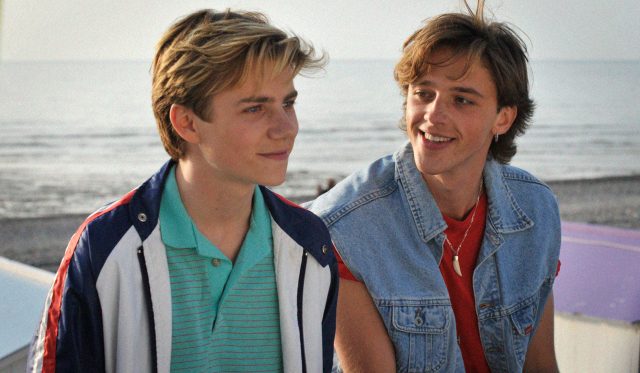Summer of 85: The World Spins, by David Bax

Even before any images appear onscreen, François Ozon’s Summer of 85 is alive. Shot on 16MM film, the grain swims about on a black screen just before an instrumental cover of The Cure’s “Just Like Heaven” kicks in and plays under the opening titles. The texture and music evoke the period much as they did in the film’s most obvious contemporary reference, Luca Guadagnino’s Call Me by Your Name (more on that later). Other great song choices include the delightfully on-the-nose use of Bananarama’s “Cruel Summer” and Rod Stewart’s cover of “Sailing,” which would already have been ten years old in 1985 and thus charmingly vintage in the eyes of the film’s teen protagonists.
Alex (Félix Lefebvre) and his parents have only lived in their seaside French burgh for a couple of years as lower middle class members of the area’s wealthy tourist-dependent economy. When Alex borrows his friend’s sailboat and then promptly capsizes it, he’s rescued by David (Benjamin Voisin), a rich kid whose family owns the large general store in the center of town. Almost immediately, Alex falls under David’s spell and the two begin a passionate romance. Like most teenage summer flings, theirs is doomed to be short lived. But the cause of its cessation and Alex’s reaction to it are where Summer of 85‘s intrigue lies.
With this specific period setting, in a small European town, with a young gay male romance and even a big, old shabby-chic house, it’s pretty much impossible not to think of Call Me by Your Name when watching Summer of 85. There is, of course, the simple argument that the novel from which the screenplay was adapted, Aidan Chambers’ Dance on My Grave, predates André Aciman’s original Call Me by Your Name novel by 25 years. But it still seems at times as if Ozon actually wants us to be thinking about Guadagnino’s film as a way of highlighting Summer of 85‘s differences, particularly the way it covers the same ground of young love in a way more rooted in the cinematic language of genre.
Comparisons to Alfred Hitchcock have come up with the release of pretty much every Ozon film since at least his first narrative feature, 1997’s See the Sea, so it feels almost kneejerk to invoke that name once again. But the influence is undeniable from the very beginning of Summer of 85, when Alex’s voiceover tells us this summer will be the first time he sees a corpse, immediately injecting suspense into the film. There’s also subterfuge (Alex dresses up as a girl to sneak into a police station) and the general sneaking around that comes with a gay romance, with which secretiveness often must unfortunately go hand in hand.
Ozon’s camera doesn’t stop being furtive even when Alex and David are alone, though. It pushes and prods, almost intrusively. But in these scenes, the meaning is different. Ozon goes in tight not just to remind us the boys are being covert but to mimic Alex’s desperation, his almost panicky desire to hold onto this moment and make it last. He understands instinctively that he is more in love with David than David is with him but his youthful fervor isn’t enough for him to know what to do about it.
Eventually, I found my mind making connections not between Summer of 85 and Call Me by Your Name or any Hitchcock films or even anything from the 1980s. Instead, I thought of Twin Peaks. That may have been due to the ominous score by Jean-Benoît Dunckel but I think it has more to do with Ozon’s vision of young people as beautiful solipsists, no more able to control how deeply they feel than how capable they are of hurting one another.



























